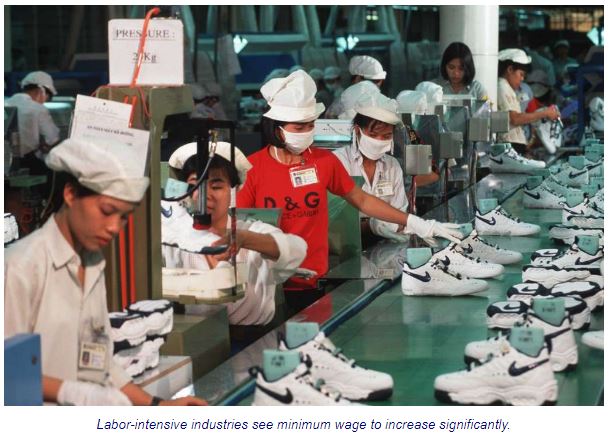Rising labor costs cause labor intensive firms to withdraw from Vietnam
The Hanoitimes – As Vietnam’s labor cost is equal and even higher than other countries, the country will have to replace the cheap labor advantage for the skilled workforce advantage in the coming time to raise the competitiveness.
Some foreign investors in labor-intensive industries are slowing their expansion plans in Vietnam and finding other countries for their new production bases due to concerns about higher labor costs in the Southeast Asian country.
Vietnam has been a large production base for many major foreign textile and garment companies, such as Makalot Industrial – a leading clothing producer for GAP, Walmart, Zara and H&M, and Eclat Textile – Taiwan’s largest sportswear supplier whose clients include Nike, Under Armour and Lululemon.
However, the companies are reconsidering the continual investment in Vietnam, saying in the near future, they foresee a shortage of labors and even fierce competitions in hiring staff in the country.
Makalot Industrial said it will slow its expansion plans in Vietnam and now focus on expanding more aggressively in Indonesia. Eclat Textile also revealed it will stop expanding in Vietnam and look elsewhere for future expansion, the media reported.
Experts are concerned the withdrawal of foreign investment will not be restricted only in the textile and garment industry if the cause is not properly dealt with.
In fact, the availability of large pools of low-cost labor has positioned Vietnam as the premier hub for labor-intensive business operations, particularly in manufacturing. Many big foreign manufacturers such as Samsung, LG, Intel, Nike and Adidas have chosen Vietnam as their destination due to the country’s low labor costs.
Therefore, it is understandable when the investors will not expand investment in the country if its labor costs are less competitive than other markets.
Data from global financial information services provider Fitch Group showed that Vietnam was among three countries in East and South East Asia that saw the largest year-on-year average minimum wage growth rates between 2015 and 2019 with 8.8 per cent, just behind Laos and China with of 14.6 per cent and 9.8 per cent, respectively.
The 2019 minimum wage in Vietnam also increased by an average of 5.3 percent across the country’s four regions, of which Region 1 (covering the urban areas of Hanoi and Ho Chi Minh City) saw the largest increase in the minimum wage – 5.9 per cent – to US$180.
Meanwhile, experts forecast that the average nominal minimum wage will continue rising in the country in the coming time, underpinned by the country’s robust economic growth, the rising costs of living and risks exacerbating wealth inequality.
Skilled workforce a must
As Vietnam’s labor cost is equal and even higher than other countries, the country will have to replace the cheap labor advantage for the skilled workforce advantage in the coming time to raise the competitiveness, experts said.
Deputy Minister of Planning and Investment Vu Dai Thang said that it is necessary to develop skilled human resources to reposition Vietnam’s competitive edge in attracting foreign investment.
However, Nihad Ahmed, senior economist at global provider of economic analysis and forecasts Focus Economics, said that one of Vietnam’s weaknesses is the lack of skilled workers, emphasizing that Vietnam is far behind China, Singapore, Malaysia and Thailand in this field while developing a highly skilled workforce is critical to attracting FDI into value-added industries.
Wim Douw, senior private sector specialist of World Bank’s International Finance Corporation, suggested Vietnam should create and implement an integrated national skills development plan to accelerate the country’s transition from low skilled to highly qualified labor, which will facilitate technology transfer from foreign invested enterprises.
To remove the shortcomings, the Vietnamese government is formulating a new national FDI attraction strategy for 2018-2030, in which the development of skilled workforce will be one of the top priorities.
Source: http://www.hanoitimes.vn/investment/2019/07/81E0D96D/rising-labor-costs-cause-labor-intensive-firms-to-withdraw-from-vietnam/


 English
English




